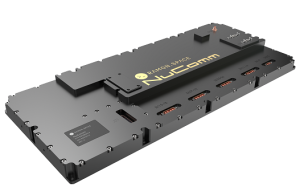The project is looking to innovate around onboard digital payloads. The company’s radiation-hardened processor will be used to deliver high-capacity, low-power programmable digital communication systems.
NuComm
According to the company, the modular, software-defined nature of the platform means the processors can be updated and reconfigured in-orbit. This could increase operational efficiency and resilience while working as part of Low Earth Orbit (LEO) constellations.
Specifically, the NuComm processor supports channelisation, 5G NTN (non-terrestrial networks), and regenerative processing (modulation and demodulation being done in the payload instead of on the ground), as well as its networking capabilities.
Surrey Research
The work involves the Guildford-based Ramon.Space UK, which is a subsidiary of the US and Israeli company.
The company officially opened in July this year, and is located in the Surrey Research Park (on Occam Road) operated by the University of Surrey.
AI
“This project represents a quantum leap in AI-based software-defined space technology, laying the foundation for a new era of satellite communications and reinforcing the UK’s leadership in this vital industry,” said Avi Shabtai, CEO of Ramon.Space.
For its part, the UK Space Agency highlighted the job opportunities of the company’s expansion
“The UK is a global leader in satellite communications and we’re accelerating the development of new services in low Earth orbit by backing innovative technologies like these advanced computing systems from Ramon Space,” said Dr Craig Brown, Director of Investment at the UK Space Agency.
“As well as supporting the development of this crucial component for onboard processing, funding from the UK Space Agency is supporting Ramon Space’s expansion in the UK, with new, high-skilled jobs being created for our thriving space sector.”

